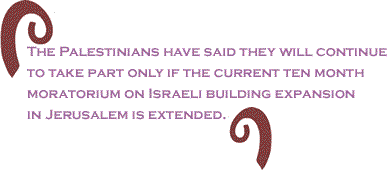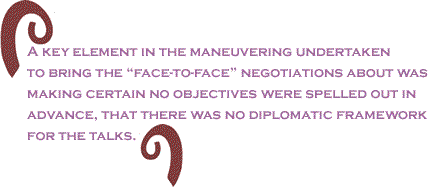| The
way the major mass media tells it, the only significant
dissenting Palestinian voice about the wisdom of Palestinian
President Mahmoud Abbas accepting the invitation to travel
to Washington for talks with Israeli Prime Minister Benjamin
Netanyahu and U.S. President Barack Obama is the militant
group Hamas.� Not by a long shot. Eleven groups, including
the Popular Front for the Liberation of Palestine (PFLP),
Hamas, Islamic Jihad, the Democratic Front for the Liberation
of Palestine, the General Command and others have called�
the negotiations under the present setup unwise. They cite
a threat of subjecting the rights of the Palestinian people
to the dictates of the U.S. and Israel while the building
of settlements in the Occupied Territories continues and
the siege of Gaza is maintained. Their recent joint statement
went on to say that the process intends to create further
"facts on the ground," whereby the military occupation
of Palestinian land is legitimized.
�We
have followed with great concern the increasing external
pressure, especially from the U.S. and Israel, on the PLO
leadership to shift from indirect negotiations (which have
not resulted in any progress) to direct negotiations without
clear and binding terms of reference regarding a complete
halt of all settlement activities in the occupied Palestinian
territory - including in Jerusalem,� said Dr. Mustafa Barghouthi,
a member of the Palestinian Parliament. �The terms of reference
should be based on international law and UN resolutions
and to include a predetermined timetable to reach a final
status agreement. The agreement will necessarily include
ending the Israeli occupation of all territories occupied
in 1967 and enabling the Palestinians to exercise the Right
of Return, right to self-determination, and the right to
an independent and sovereign state in the territory occupied
in 1967 - with Jerusalem as its capital.�

On
August 4, jailed Fatah leader Marwan Barghouthi said talks
with Israel have reached an impasse and their continuation
harms Palestinian national interests. Speaking through his
lawyer, the Palestinian leader sometimes referred to as
the Nelson Mandela of Palestine, lashed out at the prospect
of more of what he called �fruitless negotiations."
Barghouthi
called on rival Palestinian factions to enter into a unity
agreement and "reactivate" the popular resistance
movement in cooperation with international solidarity movements
as a viable alternative to negotiations. �I hereby say clearly
that neither direct nor indirect negotiations are feasible
because there is no partner on the Israeli side. Israel
has no leaders like Charles de Gaulle or Frederik de Klerk,
but instead there are extremist leaders who are adherent
to a mentality of occupation, settlements, and racism,"
he said.
Fatah,
the largest Palestinian resistance group, is clearly divided
on the subject of the Washington negotiations. For its leadership,
represented by Palestinian Authority President Abbas, another
round of failed peace talks �could spell political disaster,�
Edmund Sanders wrote in the Los Angeles Times last week.
�Abbas has bet his career on renouncing violence and pursuing
peace talks with Israel. But after nearly two decades of
negotiations, Palestinians still have no state and frustration
on the street is high.�

It
is against this backdrop that Abbas will arrive in the U.S.
capitol (assuming the trip actually does take place) Thursday.
A
key element in the maneuvering undertaken to bring the �face-to-face�
negotiations about was making certain no objectives were
spelled out in advance, that there was no diplomatic framework
for the talks. As of this writing there�s isn�t even an
agenda.
Part
of the backroom dealing leading to the announcement of the
Washington talks involved the sidelining of the quartet
of Middle East peacemakers � the U.S., the European Union,
the United Nations and Russia. The group issued a statement
of support for the talks, asserting they should "lead
to a settlement, negotiated between the parties, that ends
the occupation which began in 1967 and result in  the
emergence of an independent, democratic and viable Palestinian
state." The Palestinian side welcomed the Quartet�s
statement, however it was not mentioned when Secretary of
State Hillary Clinton announced the scheduled negotiations,
emphasizing that there were no �pre-conditions.� On Saturday,
the EU said it will not participate in the Washington talks
and that its foreign policy coordinator Catherine Ashton
will be in Beijing when they get under way. the
emergence of an independent, democratic and viable Palestinian
state." The Palestinian side welcomed the Quartet�s
statement, however it was not mentioned when Secretary of
State Hillary Clinton announced the scheduled negotiations,
emphasizing that there were no �pre-conditions.� On Saturday,
the EU said it will not participate in the Washington talks
and that its foreign policy coordinator Catherine Ashton
will be in Beijing when they get under way.
The
French government complained over the weekend that the EU
is being shut out of the Washington doings. "It would
be a shame if there were no European representation,� French
Foreign Minister Bernard Kouchner said in a speech Friday
to French ambassadors, adding that he had written a letter
to Ashton expressing his concern.
According
to a Channel 2 report, Prime Minister Netanyahu has assembled
the team that will manage Israel's negotiations with the
Palestinians. Yaakov Hadas and Daniel Taub will represent
the foreign affairs ministry in the negotiations, and Yitzhak
Molcho is set to lead the team.
The
major reason for the widespread pessimism surrounding the
upcoming talks is the reality that the seemingly best laid
plans could come to naught about three weeks after they
get underway. The Palestinians have said they will continue
to take part only if the current ten month moratorium on
Israeli building expansion in Jerusalem is extended. In
a letter to world leaders, US President Obama, Russian President
Dimitri Medvedev, UN Secretary-General Ban Ki-moon, and
the EU's Ashton. President Abbas said, �A decision to continue
settlement construction would mean Israel decided to stop
negotiations, because talks cannot continue if settlements
continue.� On extending the moratorium Moshe Taalon, Strategic
Affairs minister in the Netanyahu government, has said,
�The prime minister is opposed to it. He said that clearly.
The decision was for 10 months. [On] Sept. 27, we are immediately
going to return" to construction and "Jerusalem
is outside the discussion."

The
news agency AFP called the resumption of direct peace talks
between Israel and the Palestinians a �diplomatic success
� and �a welcome diplomatic coup for US President Barack
Obama,� and then add the caveat: �as long as negotiators
steer clear of well-known obstacles, political observers
said.�
"We
are going forward with this with a strong sense that these
talks can succeed,� Obama's counter-terrorism adviser John
Brennan told reporters. "There are a number of issues
that are outstanding," he added. That�s actually a
rather breathtaking understatement.
The
central question hanging over the diplomacy remains: the
occupation. There is a clear, international consensus �
embraced by the vast overwhelming majority of governments
-- that the Israeli occupation over Palestinian territory
captured in the 1967 war must end and that Israeli forces
must withdraw and Palestinian self-determination guaranteed
in the West Bank and Gaza. It is spelled out in United Nations
Resolutions 22 and 338 and is contained in every important
peace proposal emanating from Arab governments over recent
years. Abbas told the Quartet the Palestinians would abide
by UN Security Council and General Assembly resolutions,
the Road Map agreement, the Arab Peace Initiative, the Madrid
conference, and an agenda for direct talks which include
the issues of Jerusalem, borders, settlement, refugees,
security, water, and prisoners.
Daniel
Levy, a former Israeli peace negotiator, told the New York
Times, �Abbas wanted a clear reference to the 1967 lines;
instead he was given 12 months to continue making his case
in the hopes that the Americans will intervene decisively.�
In
the questionable likelihood that the Jerusalem settlement
issue can be finessed, the �negotiations� could continue
over the year President Obama has allotted for a settlement
but without a firm commitment to end the occupation, no
�peace process� is going anywhere.
�As
the caravans of Middle East peace negotiators rumble into
Washington next week for the umpteenth time, the pervasive
cynicism and sense of deja vu all over again is overwhelming
� and with good reason,� wrote David Garner, Financial Times
International Affairs editor August 25. �The Middle East
peace process long ago turned into a tortured charade of
pure process while events on the ground � in particular
the relentless and strategic Israeli colonization of occupied
Palestinian land � pull in the opposite direction to peace.
�We have all been colluding in a gigantic confidence trick,�
is how one Arab minister puts it, �and here we go again.��
�While
many factors had combined to hand veto powers to rejectionists
on both sides, the heart of the question remains the continuing
Israeli occupation. It is essential to remember that the
biggest single increase of Jewish settlers on Arab land
� a 50 per cent rise � took place in 1992-96 under the governments
of peace-makers Yitzhak Rabin and Shimon Peres at the high-water
mark of the Oslo peace accords. Many Israelis will point
to the perfidy of the late Yassir Arafat, who wanted to
talk peace but keep the option of armed resistance dangerously
in play. But what killed Oslo was the occupation. The second
intifada that erupted a decade ago was essentially the Oslo
war.�
�A
decade on, the Israeli settlement enterprise has turned
the occupied West Bank into a discontinuous scattering of
cantons, walled in by a security barrier built on yet more
annexed Arab land and criss-crossed by segregated Israeli
roads linking the settlements. Last month, B�Tselem, the
Israeli human rights group, published a study showing Israel
has now taken 42 per cent of the West Bank, with 300,000
settlers there and another 200,000 in East Jerusalem. The
siege of Gaza has turned that sliver of land into a vast,
open-air prison.�
�The
main feature of the present situation is the disconnect
between the high politics of the utterly discredited peace
process and these � in Israeli parlance � �facts on the
ground,� � wrote Gardner.
�A
negotiated resolution,� continued Gardner, �means two states
living in peace and security, and a Palestinian homeland
on the 22 per cent of Mandate Palestine taken by Israel
in the 1967 Arab-Israeli war. East Jerusalem would serve
as the capital of the West Bank and Gaza, with marginal
land swaps to preserve some Israeli settlements near Jerusalem.
But what does Mr. Netanyahu mean?
�He
has been most clear on what he does not mean. For a start,
he has set his face against any concessions on Jerusalem.
He wants to keep most settlements except for the far-flung
�ideological� ones and the 100-plus �outposts� established
as pawns to be traded once the chess game began. His idea
of a demilitarized Palestinian state is more like a sort
of supra-municipal administration than a self-determined,
independent government.

�Will
he surprise us, on the hackneyed Nixon and China principle
that holds it is politicians of the right who most easily
close difficult deals? There is little to suggest that.�
Gardner
continued, �The thinking of Mr. Netanyahu, son of a celebrated
promoter of Greater Israel, has always been profoundly irredentist.
While his nationalist Likud faces the constraints of being
in coalition with an assortment of ultra-rightist and ultra-orthodox
parties as well as Labour, that was plainly his choice;
the centrist Kadima party was (and remains) an alternative.
To be fair, Israel�s electoral system � with a low threshold
for entry into the Knesset that makes multi-party coalitions
inevitable � means lobbies such as the settlers can take
the national interest hostage. But Mr. Netanyahu magnifies
this by his choice of partners and by diligently firing
up the ultra-hawks in the pro-Israel lobby in the US.
�As
risks he has taken for peace, Exhibit A is the much-hyped
moratorium on settlement-building, which expires next month
and has, in any case, been speciously interpreted. While
the bulldozers to build settlements have been idling, moreover,
the bulldozers demolishing Palestinian homes have been roaring:
the rate of demolition in and around Jerusalem has doubled
this year, while the army has just razed the village of
al-Farisiye in the Jordan Valley, in line with Mr. Netanyahu�s
strategically obsolete obsession with keeping the valley
as Israel�s eastern border.
 �As
diplomacy struggles to keep alive the viability of a two-state
solution, three rival systems of control have crystallized
in the occupied territories that would make up a future
Palestinian homeland: the settlements; the crimped Palestinian
Authority of Mr. Abbas and Mr. Fayyad; and then Hamas, which
Israel and its Arab and western allies have tried and failed
to marginalize. Time is short for a negotiated outcome;
it may even have run out.� �As
diplomacy struggles to keep alive the viability of a two-state
solution, three rival systems of control have crystallized
in the occupied territories that would make up a future
Palestinian homeland: the settlements; the crimped Palestinian
Authority of Mr. Abbas and Mr. Fayyad; and then Hamas, which
Israel and its Arab and western allies have tried and failed
to marginalize. Time is short for a negotiated outcome;
it may even have run out.�
�The
outlines of a deal are clear, in the (Bill) Clinton parameters
of 2000 and Arab Peace Initiative of 2002, endorsed by 22
Arab and 57 Muslim countries (as well as Hamas, as part
of the 2007 Mecca accord),� wrote Gardner. �There has to
be an end to the occupation, and the US and Quartet cannot
just allude to this; they must demand it.�
President
Obama knows all this. The question now is: will he act decisively
or will he facilitate a farce which accomplishes nothing
but raising false hopes and the illusion of progress extending
past the November elections?� The ball�s in his court. He
can act as most of the world wises he would, or he could
prolong the agony and raise the risk of more violence in
a region that has seen more than its share. Wish I were
more optimistic.
BlackCommentator.com Editorial
Board member Carl Bloice is a writer in San
Francisco, a member of the National
Coordinating Committee of the Committees of Correspondence
for Democracy and Socialism and formerly worked for a healthcare union. Click here to
contact Mr. Bloice. |

